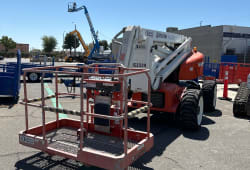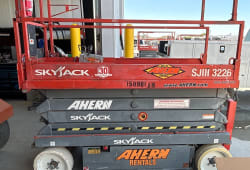Unveiling the Features and Uses of Rock Crusher
6 Lectura mínima
)
marzo 31, 2024
Rock crushers stand as stalwart guardians in the realm of heavy machinery, indispensable in various industries from mining to construction. These robust machines hold the prowess to break down large rocks into smaller, more manageable pieces, facilitating a myriad of applications across different sectors. In this comprehensive guide, we delve into the intricate features and versatile uses of rock crushers, shedding light on their significance and functionality.
Understanding Rock Crushers: An Overview
Rock crushers, also known as stone crushers, are mechanical devices designed to crush rocks into smaller fragments or gravel. They operate through the principle of compression, exerting force to break down the rocks into more manageable sizes. These machines come in various types, each catering to specific needs and requirements in different industries.
Types of Rock Crushers
Jaw Crushers
Jaw crushers are primary crushers that excel in crushing hard and abrasive materials. They feature a fixed jaw and a movable jaw, with the material being crushed between them. This type of crusher is ideal for reducing large rocks into smaller sizes for further processing.
Cone Crushers
Cone crushers are widely used in the mining and aggregate industries for secondary and tertiary crushing applications. They operate by compressing the material between a mantle and a concave, achieving finer particle sizes compared to jaw crushers.
Impact Crushers
Impact crushers, as the name suggests, utilize impact force to crush materials. They are versatile machines suitable for various applications, including recycling and quarrying. Impact crushers can produce uniform cubical-shaped end products and are renowned for their high efficiency.
Gyratory Crushers
Gyratory crushers are primarily used in the mining industry for heavy-duty crushing operations. They feature a conical head gyrating within a stationary bowl, providing a large feed opening and high capacity. Gyratory crushers are often preferred for their ability to handle abrasive materials.
Features of Rock Crushers
Robust Construction
Rock crushers boast robust construction, built to withstand the harsh conditions of mining and construction sites. They are engineered with durable materials and components, ensuring longevity and reliable performance even in demanding environments.
Power and Efficiency
Equipped with powerful engines or motors, rock crushers deliver exceptional crushing power and efficiency. They are designed to maximize productivity while minimizing energy consumption, making them indispensable assets in various industries.
Versatility in Applications
One of the most notable features of rock crushers is their versatility in applications. From primary crushing in mining operations to recycling concrete and asphalt, these machines find widespread use across diverse industries, catering to different material processing needs.
Uses of Rock Crushers
Mining Operations
In the mining industry, rock crushers play a crucial role in ore processing and mineral extraction. They are employed for the primary crushing of raw ore, reducing the ore to a manageable size for further processing in mills or concentrators.
Construction and Demolition
Rock crushers are essential equipment in construction and demolition projects, where large rocks and debris need to be crushed into smaller pieces for disposal or recycling. They are commonly used on construction sites to process materials such as concrete, asphalt, and brick.
Aggregate Production
Rock crushers are integral to the production of aggregates used in road construction, concrete production, and landscaping. They crush large rocks into smaller sizes, producing gravel, sand, and other aggregate materials essential for various construction projects.
Quarrying and stone-crushing
In quarrying operations, rock crushers are employed to extract and process stone for use in construction, landscaping, and road building. They are pivotal in breaking down large rocks into smaller sizes suitable for further processing into crushed stone products.
Frequently Asked Questions (FAQs)
What is a rock crusher?
A rock crusher is a mechanical device designed to break down large rocks into smaller, more manageable pieces. It operates through the application of force, typically compression or impact, to reduce the size of rocks or stones.
What are the main types of rock crushers?
The main types of rock crushers include jaw crushers, cone crushers, impact crushers, and gyratory crushers. Each type has its unique features and is suited for different applications and materials.
What industries use rock crushers?
Rock crushers are utilized in various industries, including mining, construction, quarrying, recycling, and aggregate production. They are essential equipment for processing raw materials such as ores, stones, concrete, and asphalt.
How do rock crushers work?
Rock crushers work by applying mechanical force to break down rocks or stones into smaller pieces. Depending on the type of crusher, this force can be exerted through compression, impact, or gyratory motion, resulting in the reduction of particle size.
What are the key features to consider when choosing a rock crusher?
Key features to consider when choosing a rock crusher include robust construction, crushing capacity, power efficiency, maintenance requirements, and versatility in applications. It's essential to select a crusher that meets the specific needs and demands of your industry or project.
What maintenance is required for rock crushers?
Maintenance requirements for rock crushers vary depending on the type and model. However, common maintenance tasks include lubrication of moving parts, inspection of worn components, and regular cleaning to prevent the buildup of debris or material.
7. How can I optimize the performance of a rock crusher?
To optimize the performance of a rock crusher, it's important to operate the machine within its recommended parameters, conduct regular maintenance, and use appropriate feeding techniques. Additionally, selecting the right type of crusher for your application and ensuring proper installation can enhance performance and efficiency.
8. What safety precautions should be taken when operating a rock crusher?
Safety precautions when operating a rock crusher include wearing appropriate personal protective equipment (PPE), following the manufacturer's guidelines and safety instructions, and securing the area to prevent accidents or injuries. It's crucial to prioritize safety at all times when working with heavy machinery like rock crushers.
Can rock crushers be used for recycling purposes?
Yes, rock crushers are commonly used for recycling purposes, such as crushing concrete, asphalt, and demolition debris into reusable materials. Recycling with rock crushers helps reduce waste and conserves natural resources by repurposing materials for new construction projects or other applications.
Where can I find more information about specific types of rock crushers?
For more information about specific types of rock crushers, their features, applications, and maintenance requirements, you can consult manufacturer's websites, and industry publications, or contact equipment suppliers and experts in the field.
Conclusion
Rock crushers stand as indispensable assets in the realm of heavy machinery, offering unparalleled efficiency and versatility in material processing applications. From mining operations to construction projects, these robust machines play a pivotal role in crushing large rocks into smaller, more manageable pieces. Understanding the features and uses of rock crushers is essential for maximizing productivity and efficiency across diverse industries.

Caleb Woods is an experienced content specialist and an editor at Boom & Bucket, blending his journalism background with expertise in the heavy equipment industry. He delivers engaging, informative content to help professionals stay informed and make smarter decisions in the machinery market.











